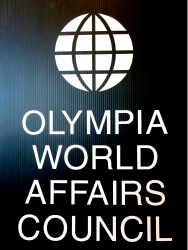January 19th, 2017
Illegal international trade in elephant ivory has skyrocketed in recent years, and images of carcasses and recovered ivory carvings populate the media. The speakers will discuss international responses to the ivory crisis, the complexities of living with elephants in southern Africa, and localized aspects of elephant conservation on the ground.
Parakh Hoon teaches politics at South Puget Sound Community College. He received his Ph.D. in Political Science from the University of Florida, Gainesville in 2005, with specialization in conservation politics in Botswana and Zambia. He currently teaches American Government and International Relations. His research focuses on the political economy of wildlife conservation in southern Africa. His book manuscript, Conserving Nature in a Developmental State, a political history of wildlife conservation and state building in Botswana, is forthcoming with Lexington Press.
Rachel DeMotts teaches environmental studies and directs the Environmental Policy and Decision-Making Program at the University of Puget Sound. She received her Ph.D from the University of Wisconsin in 2005, with dissertation research focused on the politics of transfrontier conservation areas in Mozambique, South Africa, and Zimbabwe. Her research interests lie in gender and community-based conservation, the political economy of tourism, and the politics of transboundary natural resource management.
They have been studying the politics of elephant conservation since 2007, examining the local impacts of human-elephant conflict in northern Botswana and northeastern Namibia.
Illegal international trade in elephant ivory has skyrocketed in recent years, and images of carcasses and recovered ivory carvings populate the media. The speakers will discuss international responses to the ivory crisis, the complexities of living with elephants in southern Africa, and localized aspects of elephant conservation on the ground.
Parakh Hoon teaches politics at South Puget Sound Community College. He received his Ph.D. in Political Science from the University of Florida, Gainesville in 2005, with specialization in conservation politics in Botswana and Zambia. He currently teaches American Government and International Relations. His research focuses on the political economy of wildlife conservation in southern Africa. His book manuscript, Conserving Nature in a Developmental State, a political history of wildlife conservation and state building in Botswana, is forthcoming with Lexington Press.
Rachel DeMotts teaches environmental studies and directs the Environmental Policy and Decision-Making Program at the University of Puget Sound. She received her Ph.D from the University of Wisconsin in 2005, with dissertation research focused on the politics of transfrontier conservation areas in Mozambique, South Africa, and Zimbabwe. Her research interests lie in gender and community-based conservation, the political economy of tourism, and the politics of transboundary natural resource management.
They have been studying the politics of elephant conservation since 2007, examining the local impacts of human-elephant conflict in northern Botswana and northeastern Namibia.
